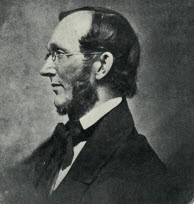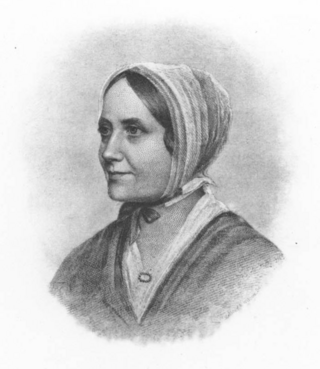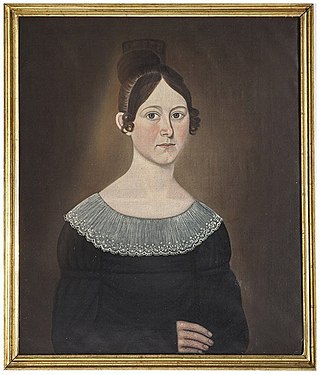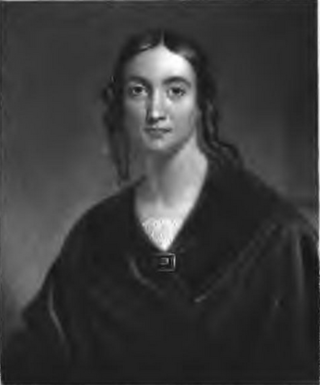Sarah Carter Edgarton Mayo | |
|---|---|
 | |
| Signature | |
| |
Sarah Carter Edgarton Mayo (born in Shirley, Massachusetts, 17 March 1819; died in Gloucester, Massachusetts, 9 July 1848) was an American author and editor.
Sarah Carter Edgarton Mayo | |
|---|---|
 | |
| Signature | |
| |
Sarah Carter Edgarton Mayo (born in Shirley, Massachusetts, 17 March 1819; died in Gloucester, Massachusetts, 9 July 1848) was an American author and editor.
She did well in the district school, and attended Westford Academy for a semester. She taught herself French and Latin. To offset reduced income from her father's business, [1] she began to contribute to journals at the age of 16, and at 17 she joined the Universalist Church, which her parents, manufacturer Joseph Edgarton and his second wife Mehitable Whitcomb, also belonged to. [2]
She edited The Rose of Sharon, an annual, from 1840 until 1848, [3] and was an associate editor of The Universalist and Ladies' Repository, a monthly magazine in Boston, from 1839 until 1842. [2] Between 1836 and 1844, she published The Palfreys, Ellen Clifford, and Memoirs of Mrs. Julia W. Scott, and compiled The Poetry of Women, The Flower Vase, Spring Flowers, The Floral Fortune Teller, Language and Poetry of Flowers and Fables of Flora. [3] She associated with the writer Charlotte Ann Fillebrown Jerauld.
With her earnings, she was able to support her family through its financial troubles and also put her younger brother, John Marshall Edgarton, through Harvard University. Her brother taught her German, and obtained books from Harvard for her. [2] He graduated in 1847, and began work on starting a magazine, but died that year. [4]
Sarah Edgarton married Amory Dwight Mayo in 1846, [3] and the couple moved to Gloucester. [2] They had a daughter in September 1847. Her health deteriorated afterward, and she died in July 1848. [1]

George Stillman Hillard was an American lawyer and author. Besides developing his Boston legal practice, he served in the Massachusetts legislature, edited several Boston journals, and wrote on literature, politics and travel.

Lydia Maria Child was an American abolitionist, women's rights activist, Native American rights activist, novelist, journalist, and opponent of American expansionism. Her journals, both fiction and domestic manuals, reached wide audiences from the 1820s through the 1850s. At times she shocked her audience as she tried to take on issues of both male dominance and white supremacy in some of her stories.

Samuel Hoar was a United States lawyer and politician. A member of a prominent political family in Massachusetts, he was a leading 19th century lawyer of that state. He was associated with the Federalist Party until its decline after the War of 1812. Over his career, Hoar developed a reputation as a prominent Massachusetts anti-slavery politician and spokesperson. He became a leading member of the Massachusetts Whig Party, a leading and founding member of the Massachusetts Free Soil Party, and a founding member and chair of the committee that organized the founding convention for the Massachusetts Republican Party in 1854.

The Boston Brahmins or Boston elite are members of Boston's traditional upper class. They are often associated with a cultivated New England or Mid-Atlantic dialect and accent, Harvard University, Anglicanism, and traditional British American customs and clothing. Descendants of the earliest English colonists are typically considered to be the most representative of the Boston Brahmins. They are considered White Anglo-Saxon Protestants (WASPs).

Francis Bowen was an American philosopher, writer, and educationalist.

Amos Adams Lawrence was an American businessman, philanthropist, and social activist. He was a key figure in the United States abolitionist movement in the years leading up to the Civil War and the growth of the Episcopal Church in Massachusetts. He was instrumental in the establishment of the University of Kansas and Lawrence University in Appleton, Wisconsin.
Amory Dwight Mayo was a Christian clergyman and educator.

Sarah Helen Power Whitman was an American poet, essayist, transcendentalist, spiritualist and a romantic interest of Edgar Allan Poe.

John Sullivan Dwight was an American classical music critic, transcendentalist, school director, and minister. He is considered America's first influential music critic.

Eliza Lee Cabot Follen was an American writer, editor, and abolitionist. In her early life, she contributed various pieces of prose and poetry to papers and magazines. In 1828, she married Prof. Charles Follen, who died on board the Lexington in 1840. During her married life, she published a variety of popular and useful books, all of which were characterized by her Christian piety. Among the works she gave to the press are, Selections from Fénelon, The Well-spent Hour, Words of Truth, The Sceptic, Married Life, Little Songs, Poems, Life of Charles Follen, Twilight Stories, Second Series of Little Songs, as well as a compilation of Home Dramas, and German Fairy Tales. Holding an interest in the religious instruction of the young, she edited, in 1829, the Christian Teacher's Manual, and, from 1843 to 1850, the Child's Friend. She died in Brookline, Massachusetts in 1860.

Mary Tyler Mann was a teacher, author, and mother. She was the wife of Horace Mann, American education reformer and politician.

Charlotte A. Jerauld was an American poet and story writer. A zealous Universalist, she contributed to Christian magazines such as Ladies' Repository, the Rose of Sharon, the Universalist Quarterly, the Miscellany, the Union, and the Star of Bethlehem. Jerauld died in 1845, age 25, after a birth, her dead infant, five days old, buried in the coffin with her.

Caroline M. Sawyer was a 19th-century American poet, writer, and editor. Her writings ranged through a wide variety of themes. Born in 1812, in Massachusetts, she began composing verse at an early age, but published little till after her marriage. Thereafter, she wrote much for various reviews and other miscellanies, besides several volumes of tales, sketches, and essays. She also made numerous translations from German literature, in prose and verse, in which she evinced an appreciation of the original. Sawyer's poems were numerous, sufficient for several volumes, though they were not published as a collection.

Sarah Alden Bradford Ripley was an American educator and noted scholar at a time when women were rarely admitted to universities. She acquired most of her knowledge of the classics, philosophy, modern languages, botany, astronomy, and chemistry through independent study. She was reputedly "one of the most learned women of the nineteenth century."

Luella Dowd Smith was an American educator and author of prose and verse. She was active in social reform movements of the day. Smith taught school for ten years and was the principal of three high schools and one academy. She was also active in the areas of temperance, Sunday school, prohibition, and equal suffrage. Smith wrote for the National Temperance Society. She was the author of Wayside Leaves, 1879; Wind Flowers, 1887; Flowers from Foreign Fields, 1895; The Value of the Church, 1898; Thirteen Temperance Theses and Two Trilogies, 1901; as well as Ways to win, 1904; Daily ideas and ideals, 1930; and Along the way; poems, 1938.

Alice Mary Dowd was an American educator and author. She was born in Virginia in 1855 and began teaching at the age of seventeen. Dowd taught for more than three decades before retiring in 1926, having had experience in almost all phases of the work, including district school substitute, evening school, private school, high school, college, and Sunday school. Besides numerous uncollected poems, she published a volume entitled Vacation Verses in 1890. In 1906, she published Our Common Wild Flowers. With her sister, Luella Dowd Smith, she co-authored another book of poetry, Along the Way, in 1938. Dowd was an occasional contributor to papers, and at one time, a regular contributor to the magazine edition of Pasadena News. Dowd died in 1943.

Luella J. B. Case was a 19th-century American author. She wrote several popular books and was a contributor to various periodicals, including The Rose of Sharon, The Ladies' Repository, and The Universalist Review among others. Affiliated with the Universalist church, she also wrote hymns.

Julia H. Scott was an American author who had the distinction of being the Poet of Sheshequin. She wrote numerous articles of prose and poetry, which were published in many of the most popular literary periodicals in the U.S. She was a prominent literary figure in the Universalist religion, along with Sarah Carter Edgarton Mayo and Caroline Mehitable Fisher Sawyer.
Mary Ann H. Dodd was a 19th-century American poet.

Sarah Maria Clinton Perkins was an American Universalist minister, social reformer, lecturer, editor, and author of Sunday school books. Early in life, she was engaged in educational work. She was involved in the temperance movement and advocated for women's suffrage. She was an early abolitionist and an early Prohibitionist. Perkins was a highly educated woman, a writer and speaker of rare force. Moving to Cleveland, Ohio, after being widowed in 1880, she was for many years actively connected as National Lecturer with the Woman's Christian Temperance Union (WCTU). She filled various other positions in reform associations including, President of Cleveland's Equal Franchise Club, and president of the Literary Guild of Cleveland.